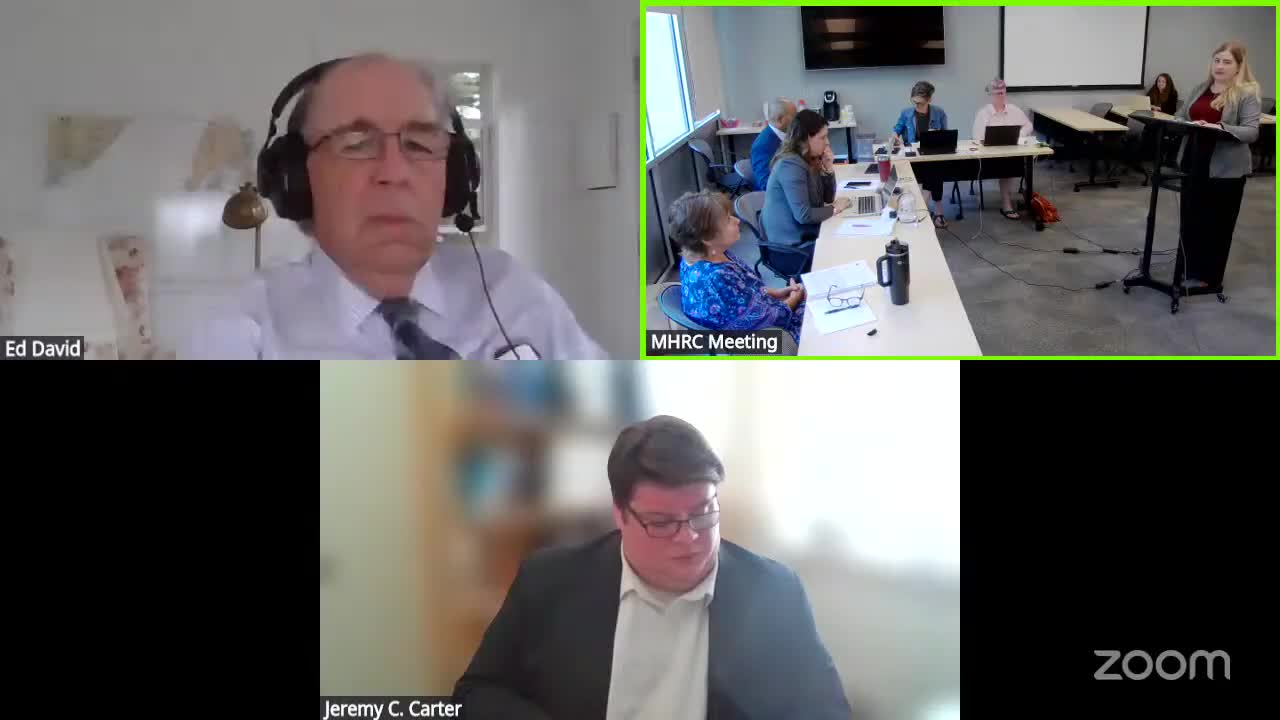Housing Manager's Actions Spark Discrimination Claims in Disability Case
July 30, 2025 | Human Rights Commission, Maine, Executive, Maine
This article was created by AI summarizing key points discussed. AI makes mistakes, so for full details and context, please refer to the video of the full meeting. Please report any errors so we can fix them. Report an error »

The Maine Human Rights Commission convened on July 28, 2025, to address a significant case involving allegations of discrimination against a housing provider for individuals with disabilities. The case centers on a client who was terminated from his housing due to a reasonable accommodation request related to his disability.
During the meeting, the client's attorney argued that the housing manager's actions constituted unlawful discrimination. They claimed that the manager denied the client's request for reasonable accommodation without conducting a proper inquiry, leading to a legal eviction based on the severity of the client's disability. The attorney emphasized that the housing manager failed to engage in the required analysis under state and federal fair housing laws, which protect individuals with disabilities from discrimination.
The attorney requested that the Commission find reasonable grounds for the allegations, asserting that the housing provider's actions were based on fear rather than factual evidence. They argued that the denial of the accommodation request was not justified, as it lacked a thorough assessment of the client's situation and potential risks.
In response, the representative from the Department of Health and Human Services defended the housing provider's actions, stating that the termination of services was necessary due to a threat made by the client against a staff member. They argued that the request for accommodation was not valid, as it sought to reverse a decision that was made in the interest of safety.
The discussion highlighted the complexities of balancing the rights of individuals with disabilities against the safety concerns of housing providers. The Commission members engaged in a dialogue about the appropriateness of delaying accommodation discussions while legal matters, such as a protection from harassment order, were pending.
As the meeting concluded, the Commission was tasked with determining whether the housing provider's actions violated fair housing laws. The outcome of this case could have significant implications for the rights of individuals with disabilities in Maine, particularly regarding their access to housing and the responsibilities of providers to accommodate their needs. The Commission's decision is expected to reaffirm or challenge existing standards for reasonable accommodation in housing situations involving individuals with disabilities.
During the meeting, the client's attorney argued that the housing manager's actions constituted unlawful discrimination. They claimed that the manager denied the client's request for reasonable accommodation without conducting a proper inquiry, leading to a legal eviction based on the severity of the client's disability. The attorney emphasized that the housing manager failed to engage in the required analysis under state and federal fair housing laws, which protect individuals with disabilities from discrimination.
The attorney requested that the Commission find reasonable grounds for the allegations, asserting that the housing provider's actions were based on fear rather than factual evidence. They argued that the denial of the accommodation request was not justified, as it lacked a thorough assessment of the client's situation and potential risks.
In response, the representative from the Department of Health and Human Services defended the housing provider's actions, stating that the termination of services was necessary due to a threat made by the client against a staff member. They argued that the request for accommodation was not valid, as it sought to reverse a decision that was made in the interest of safety.
The discussion highlighted the complexities of balancing the rights of individuals with disabilities against the safety concerns of housing providers. The Commission members engaged in a dialogue about the appropriateness of delaying accommodation discussions while legal matters, such as a protection from harassment order, were pending.
As the meeting concluded, the Commission was tasked with determining whether the housing provider's actions violated fair housing laws. The outcome of this case could have significant implications for the rights of individuals with disabilities in Maine, particularly regarding their access to housing and the responsibilities of providers to accommodate their needs. The Commission's decision is expected to reaffirm or challenge existing standards for reasonable accommodation in housing situations involving individuals with disabilities.
View full meeting
This article is based on a recent meeting—watch the full video and explore the complete transcript for deeper insights into the discussion.
View full meeting
